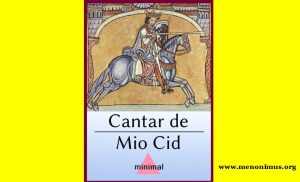Cantar de Mio Cid-A Review
Cantar de Mio Cid-A Review
Cantar de Mio Cid-A Review
Introduction:
The ‘‘Cantar de Mio Cid’’, often referred to simply as the ‘‘El Cantar del Mio Cid’’ or ‘‘The Song of the Cid’’, is a remarkable piece of medieval Spanish literature that has captivated audiences for centuries. This epic poem stands as a testament to the rich literary heritage of Spain, offering readers a vivid portrayal of chivalry, honor, and the enduring spirit of a legendary hero. Penned in the 12th century, the poem serves as a mirror to the values, culture, and historical context of its time while also transcending its origins to offer timeless themes that continue to resonate with contemporary audiences.
Narrative and Plot:
The poem follows the life and adventures of Rodrigo Díaz de Vivar, known as El Cid, a valiant and revered warrior who embodies the quintessence of honor, loyalty, and resilience. Set against the backdrop of the Reconquista, a period of intense conflict between the Christians and the Moors in medieval Spain, the narrative is a chronicle of El Cid’s rise, fall, and ultimate triumphs. The plot’s dynamic progression seamlessly interweaves elements of politics, war, personal relationships, and the pursuit of justice, rendering a tale that remains engaging from start to finish.
Characterization:
The characters within the ‘‘Cantar de Mio Cid’’ are skillfully portrayed, each with distinct personalities that contribute to the overall texture of the narrative. El Cid stands as the epitome of honor, exemplifying the medieval ideals of bravery and leadership. His unwavering loyalty to king and kin alike, even in the face of adversity, showcases his moral fortitude and complex nature. Supporting characters, such as his wife Doña Ximena and loyal vassals like Álvar Fáñez, provide depth to the story, allowing readers to witness the interplay of relationships amidst the challenges of the time.
Themes and Values:
At its core, the ‘‘Cantar de Mio Cid’’ is a reflection of the societal values prevalent during its composition. Themes of loyalty, honor, and valor permeate the poem, offering insight into the cultural mindset of the medieval Spanish nobility. The concept of honor is particularly prominent, and El Cid’s quest to restore his honor after being unjustly exiled drives the narrative forward. This exploration of honor extends beyond the personal realm, as the poem also delves into the broader themes of loyalty to one’s country and comrades.
Language and Style:
The language of the ‘‘Cantar de Mio Cid’’ is imbued with poetic richness and medieval linguistic nuances that showcase the artistry of its creators. Employing a unique blend of Castilian dialects, the poem exemplifies the evolution of the Spanish language while maintaining a rhythmic flow that contributes to its oral tradition. The poem is divided into cantares, or songs, each with a distinct rhythmic structure, which lends a musical quality to the recitation or reading.
Enduring Legacy:
The ‘‘Cantar de Mio Cid’’ continues to be a significant cornerstone in the study of medieval Spanish literature. Its influence extends to modern works and adaptations, inspiring writers, scholars, and artists alike. The poem’s exploration of fundamental human qualities such as honor, loyalty, and resilience remains ever-relevant, allowing it to transcend its historical context and resonate with audiences across cultures and generations.
Conclusion:
In conclusion, the ‘‘Cantar de Mio Cid’’ stands as a monumental work of medieval Spanish literature, offering readers a captivating glimpse into the valor and virtues of a legendary hero. Its intricate narrative, vivid characters, and exploration of timeless themes firmly establish its place as a literary treasure that continues to shine brightly in the literary firmament. This epic poem serves as a testament to the enduring power of storytelling and its ability to bridge the gap between centuries, cultures, and hearts. 0 0 0.
Cantar de Mio Cid-A Review
N.B. The article originally belongs to the book entitled ‘The Reviews of Epic Literature Around the World‘ by Menonim Menonimus.
You May Like:








